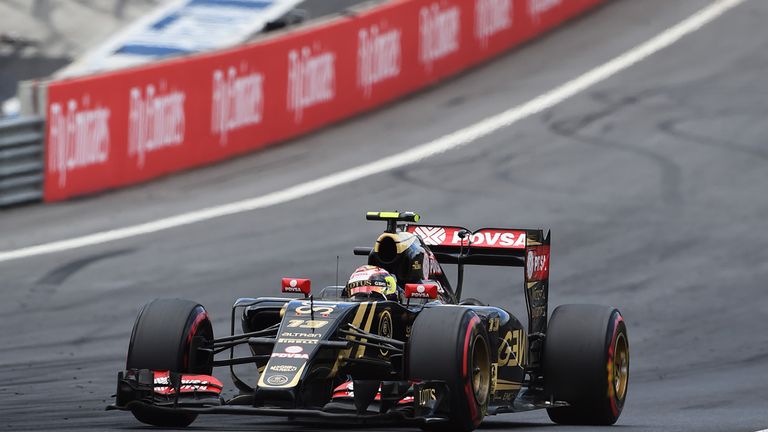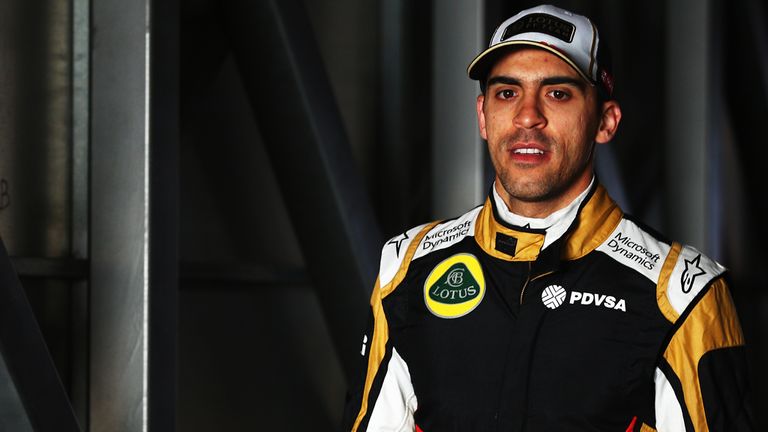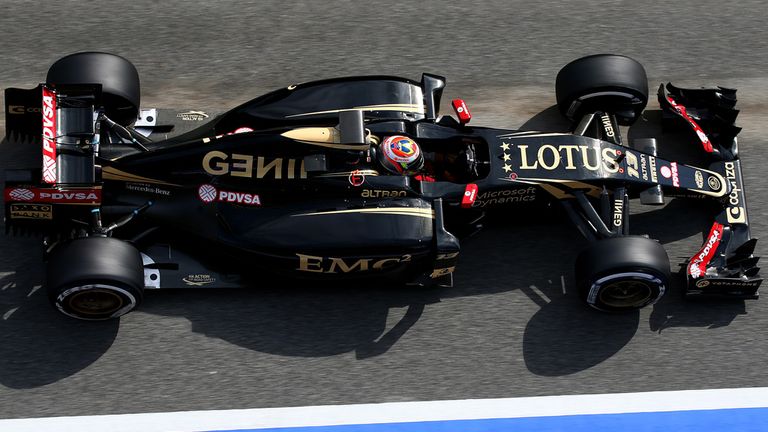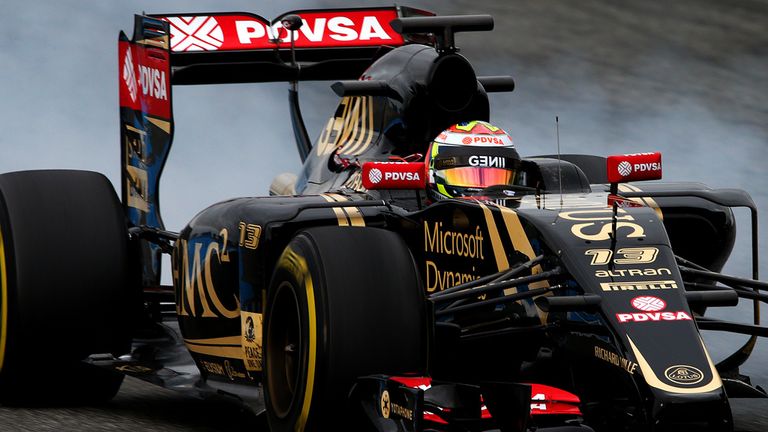After his great save in Austria, could Pastor Maldonado become a great?
After witnessing what he considers to be 'one of the greatest pieces of raw, reactive car control ever seen' from the Lotus driver, Sky Sports F1 analyst Mark Hughes ponders whether Pastor Maldonado is ready to bloom as a great driver
Thursday 25 June 2015 09:04, UK
Pastor Maldonado’s late-race chase of Max Verstappen’s seventh place was a highlight of the Austrian Grand Prix, one which culminated in one of the greatest pieces of raw, reactive car control ever seen.
As Pastor had tried to sell Max a dummy – lining up as if to pass on the inside as they raced down the pit straight, then switching left for the outside – he was caught out by how much earlier the old-tyred Verstappen had to brake.
Pastor thus found himself in a situation similar to that Max had found himself in at Monaco when trying to pass Romain Grosjean. Flat out in eighth gear with his DRS flap deployed, at 201mph, Maldonado was forced to suddenly swerve left to avoid the back of the slowing Toro Rosso.
The resultant wild moment looked totally irretrievable as the Lotus, sparks cascading from its underside as it ground out over the bumps, lost grip at the rear, which slewed sideways. Detailed analysis of the video confirms the car was actually 50-deg out of line at its peak!
In the normal course of events Maldonado’s car would have spun – possibly along the grass into the barriers on the left, or if he was lucky, harmlessly up to the turn one run-off area – and that would have gone down as ‘just another Maldonado disaster’ in an F1 career peppered with accidents and incidents.
But instead, Maldonado somehow managed to get the opposite lock on quickly enough to catch the slide and – even more impressively at this speed – get it off again quickly enough that the car didn’t then snap back and spin in the other direction.
Getting on the brakes closed his DRS, returning his rear grip, and he slowed for the turn – and made it past Verstappen as the latter slid up the escape road. Maldonado’s reactions and split-second instincts were quite remarkable; the whole red alert emergency save lasted not much more than a second and looked almost like speeded-up footage. That’s how unfeasible this remarkable piece of driving looked.
So by the skin of his teeth and the miracle of his hand movements, he’d completed a second consecutive strong race in the points. This and a good sixth place in Canada came on the back of his habitually amazing speed around Monaco, though on that occasion he was thwarted by a leak in the braking system and was forced to retire.
Two swallows don’t make a summer, but is Maldonado – in his fifth season of F1 – finally becoming a reliable performer whilst sill retaining the speed and the thrill of his attacking style?
Earlier this year Lotus’ frustration with him was mounting, regardless of the fact that his backers PDVSA contribute massively to the team’s operating budget. That frustration was felt all the more keenly because beneath the incidents, his race pace was excellent.
He has always been extremely sensitive to the vagaries of the Pirelli tyres and is among the very best at gauging how to keep them in good shape over a race stint. This was allowing him to have stronger end of stint pace than team-mate Romain Grosjean but the mistakes – never the same on any two occasions and thus impossible to anticipate – were thwarting the potential benefits of that and valuable points were being lost.
Williams used to suffer similar frustration with him. There, Alex Wurz had got specialist help for him in understanding the patterns behind the frequent red mist emotions triggered by wheel-to-wheel combat that were often the trigger for his incidents, overpowering his thought processes when they flashed.
Once they had analysed things, Pastor reportedly understood very well the mechanisms at play – but in times of high stress we all tend to revert to old behaviours. It was going to be a long time before he had enough experience to recognise those moments when they came and alter his instincts accordingly.
But would F1 give up on him before that time? Being the favoured sportsman of Venezuela – he is a massive superstar in his home country – with the government-sponsored support that came with it, at least mitigated against him being simply passed over.
His first-year Williams team-mate Rubens Barrichello was frequently amazed at some of the telemetry steering traces of his team-mate, recalling that ‘his front wheels looked like those on a supermarket trolley’ yet Pastor’s very busy style was often highly effective in producing a fast lap. His familiarity with such a busy style even when not reacting to an emergency probably played its part in that miraculous save on Sunday.
In 2011 he assumed Nico Hulkenberg’s former rookie driver role at Williams. The team’s then technical director Sam Michael reckoned Maldonado’s raw pace was even better. But the team was glad to see the back of him at the end of 2013, regardless of the fact that he’d won the 2012 Spanish Grand Prix for them with a faultlessly polished display under a lot of pressure from Fernando Alonso’s Ferrari.
In assessing whether his recent incident-free run might be the beginning of him finally coming good, it could be significant that in Canada, as the delayed faster cars of Sebastian Vettel and Felipe Massa caught him, he was impeccable in giving them racing room when the moment came. Not submissive, making it difficult for them, but recognising the exact moment when to surrender.
Furthermore, his dice with Verstappen on Sunday had all the ingredients that might ordinarily have triggered that red mist in him – a slower car being driven very defensively, repeatedly thwarting his attempts at passing. “He wasn’t really leaving me space, as the rules say you should,” he said afterwards. “When I saw him doing this I said I need to be more careful but more aggressive.”
Being able to resolve those apparently contradictory demands is exactly what separates a great driver from either an ineffective one or a crazy one.
There have been crazy F1 drivers in the past, some of them even becoming reformed good citizens, but invariably at the expense of their early spark and fire. Andrea de Cesaris – like Maldonado, allowed a long career despite his many accidents because he brought significant financial muscle with him – was one such.
In his first half-dozen seasons he was impressively fast, but scarily reckless. By the time of his Rial, Dallara and Tyrrell drives in the late 80s/early 90s, he was a safe – but slower – pair of hands. Maldonado shows no signs of slowing down, but there are definite signs that his composure in the car may be improving.
Vittorio Brambilla was fast enough to win the ’75 Austrian Grand Prix – but even then he crashed immediately after crossing the line. He too was incident-free but slow in the final phase of his career.
Brambilla’s loss of control in Austria that day was in fact just a hundred metres or so from where Maldonado made his miraculous save on Sunday. Is the great driver that has always lay hidden beneath Maldonado’s craziness finally about to emerge?
MH







